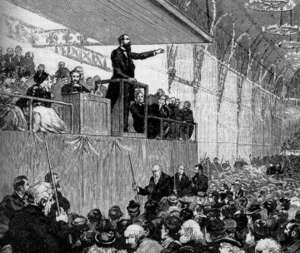| Movement
among American evangelicals to assert biblical authority as over-against
several aspects of modernity. |
 |
|
American
revivalist Dwight L. Moody (1837-1899)
was an inspiration to many in the early Fundamentalist movement
|
"Fundamentalism"
is so named for five beliefs, deemed fundamental to Christianity: inerrancy
of Scripture, the virgin birth of Christ, the substitutionary atonement
of Christ, the authenticity of miracles, and the resurrection of Christ.
In the late nineteenth century, fundamentalism formed as a coalition of
Christians, concerned that liberalism, biblical
criticism, and Darwinism were penetrating schools and churches. They
believed that biblical authority and the Christian message were at stake.
Upon losing many battles for control of religious and public institutions,
most fundamentalists withdrew to build their own networks of schools,
churches and publications. Beginning in the 1950s, moderate evangelicals
chafed under a fundamentalist ethos which was separatistic and combative;
these moderates followed Billy Graham
and other leaders into a broader evangelicalism.
In the late twentieth century fundamentalism reentered the public arena,
debating such issues as evolution, abortion, and the prohibition of prayer
in the public schools.
|